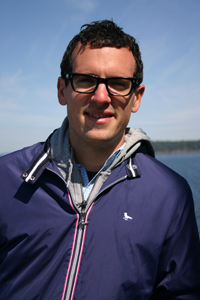FULBRIGHT RECIPIENT JUSTIN SANDERS '00 EXPLORES MATTERS OF LIFE AND DEATH IN THE UNITED KINGDOM

Details
Justin Sanders '00 wants to understand how people of various cultures live—by learning how they choose to die.
Sanders, who just graduated from medical school at the University of Vermont, will use his newly awarded Fulbright scholarship to travel to London This Summer and pursue two goals: a master's degree in medical anthropology (the study of how various cultures experience illness and disease and interact with medical systems) and a comprehensive examination of cultural barriers to the use of palliative (end-of-life) care services. Research has shown that people from diverse communities are less likely to use these services; Sanders wants to know why, and England, he feels, is the ideal place to find answers—not just because it's where the first hospice opened in 1976.
“In the U.S., you can't look at facts that affect the utilization of health care without considering socioeconomic status,” Sanders explains.“For example, if African American women in the south have higher rates of complications during childbirth, it's because they couldn't afford the pre-natal care, and the doctors weren't there to help them.” England, however, has a universal health care system that guarantees access to everyone, so Sanders can focus on cultural rather than economic factors.
Another point in England's favor is its domestic policy of multiculturalism, as opposed to what Sanders calls the“integrationist” policy in the U.S.“People live how they want, in culturally intact communities,” he says.“It's an ideal opportunity to study the cultural aspects of medical care.”
In London, Sanders will concentrate his research on a community of South Asian Muslims. His decision was motivated by several factors, not the least of which are the war in Iraq and tensions between East and West.“We're engaged with the Muslim world in an ideological struggle on how to live life,” he says.“We need to reach out for any common threads—understanding how we die might reveal a commonality about how we live. Many Muslims think we are out to destroy Islam, and we need to do what we can to undermine the idea of a war. Our cultures are not so different.”
Ultimately, Sanders hopes that his anthropology training will provide him with the tools he needs to understand—and break down—people's resistance to end-of-life care, which he plans to make his life's work:“I want to encourage them to use these services, and help them die a good death.”
When he returns to the States in the summer of 2008, Sanders will move to New York City to begin his residency at the Bronx's Montefiore Medical Center, in its Department of Family and Social Medicine. He will be treating many underserved members of the community, and interacting with experts in state and national health policy.
Sanders will also continue to battle pharmaceutical companies' influence on physicians' practices, a cause with which, as a medical student, he was heavily involved as national coordinator of AMSA's (American Medical Student Association) Pharm Free campaign. In New York, he'll have the chance to collaborate with a similar group called No Free Lunch, whose founder, Bob Goodman, works at Montefiore.
“We want to raise awareness of the detrimental aspects of pharmaceutical marketing, and help physicians understand the effects of having a relationship with pharmaceutical companies,” says Sanders.“We want doctors to take the higher road and not engage with representatives.”
— Brenna McBride



